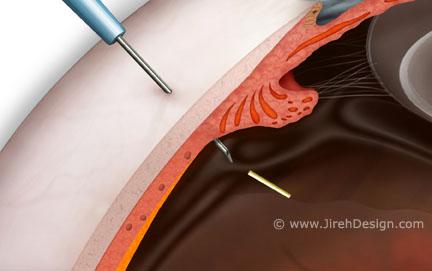Iluvien for diabetic macular edema – our first two years


Iluvien for diabetic macular edema – our first two years
Two years after our first breakthrough diabetic retinopathy treatment…
Iluvien® for diabetic macular edema treatment.

What does diabetes do to the eye?
“In some patients, the macula may swell and cause chronic blurry vision.” explains Dana M. Deupree, MD, FACS, a vitreo-retina specialist in Clearwater who manages and treats all forms of diabetic eye disease. This macular swelling is called Diabetic Macular Edema, or DME, and it is the most common cause of vision loss associated with diabetic retinopathy. The onset of DME is painless and may go undetected until it manifests as difficulty reading, driving and doing other daily activities.
In February of 2015, Dr. Deupree was invited by Alimera Sciences, Inc. to be among the first ophthalmologists in Florida and one of just a handful in the country to treat DME patients with Iluvien (fluocinolone acetonide intravitreal implant).
What is Iluvien?
Iluvien, approved in the U.S. for some patients whose DME has not responded well to other treatments, is an intraocular implant that provides long-term relief from macular swelling by releasing very small levels of medication (fluocinolone acetonide) into the eye over a period of 36 months.
Dr. Deupree’s first round of Iluvien-treated patients are now entering their third year with the implant. “We are very happy with the results so far,” Dr. Deupree said. “These are patients who have been able to reduce their eye doctor visits from ten per year (with eye injections on every visit), to only two or three visits for quick checkups or ‘maintenance’ treatments.”
Macular edema is monitored during follow-up visits with an Optical Coherence Tomography (OCT) scan. OCT provides Dr. Deupree an automated, segmented representation of the patient’s macular layers. These scans have demonstrated remarkable improvement in DME patients who received the Iluvien implant.
Adding the Iluvien treatment to his patient services was a natural extension of the dedication to excellence Dr. Deupree fosters in his practice. “Iluvien allows us to give new hope to our diabetic patients.” Dr. Deupree said.
See also: Diabetic Retinopathy, Diabetic Eye Disease, DME Treatments






